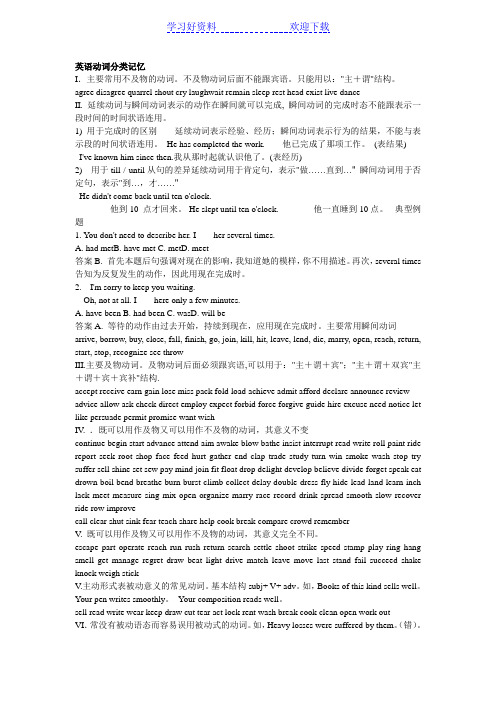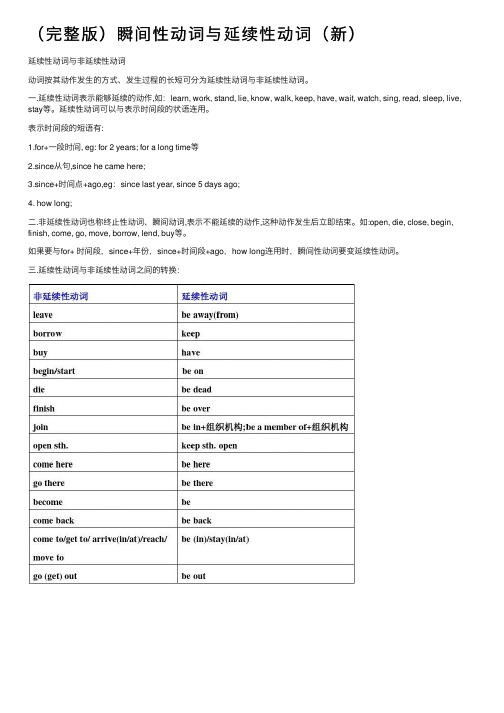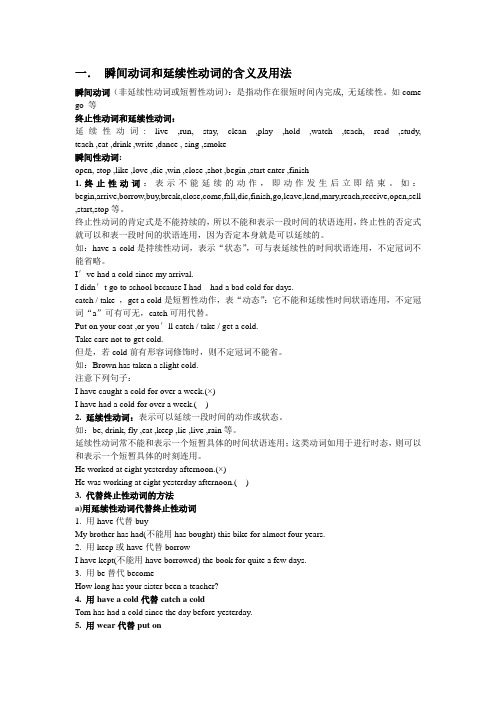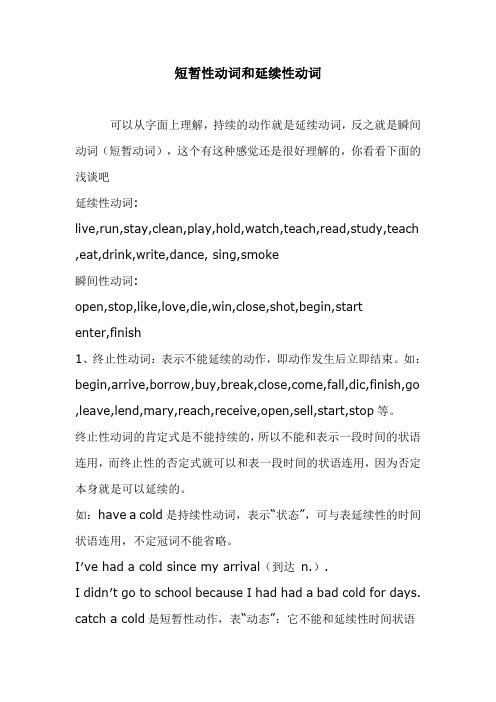完整版瞬间性动词与延续性动词新
瞬间动词与延续性动词

Practice: 瞬间动词和延续性动词、状态句型转化练习(1): 瞬间动词和延续性动词 状态句型转化练习( 动词和延续性动词、
1、你来晚了,电影已放了10分钟了。 分钟了。 你来晚了,电影已放了10分钟了 been on for 10 minutes. A: You are late. The film has ten minutes since the film . B: You are late. It is C: You are late. The film began/started 10 began/started began/ began/ minutes ago . 2、我叔叔当兵已经有2年了。 我叔叔当兵已经有2年了。 been in A: My uncle has the army for 2 years. B: It is 2 years since my uncle joined the army. C: My uncle joined the army 2 years ago. 3、Linda 已经感冒4、5天了。 已经感冒4 天了。 has had A: Linda a cold for 4 to 5 days. 4 to 5 days since Linda caught a cold B: It is C: Linda caught a cold 4 or 5 days ago .
规则动词的过去分词
work visit ask play stay worked worked visited visited asked asked played played stayed stayed stop drop rob plan prefer
We have had the book for three years. years. We bought the book three years ago. ago.
动词分类(瞬间动词延续性动词)

英语动词分类记忆I.主要常用不及物的动词。
不及物动词后面不能跟宾语。
只能用以:"主+谓"结构。
agree disagree quarrel shout cry laughwait remain sleep rest head exist live danceII. 延续动词与瞬间动词表示的动作在瞬间就可以完成, 瞬间动词的完成时态不能跟表示一段时间的时间状语连用。
1) 用于完成时的区别延续动词表示经验、经历;瞬间动词表示行为的结果,不能与表示段的时间状语连用。
He has completed the work.他已完成了那项工作。
(表结果)I've known him since then.我从那时起就认识他了。
(表经历)2)用于till / until从句的差异延续动词用于肯定句,表示"做……直到…" 瞬间动词用于否定句,表示"到…,才……"He didn't come back until ten o'clock.他到10 点才回来。
He slept until ten o'clock.他一直睡到10点。
典型例题1. You don't need to describe her. I ___ her several times.A. had metB. have metC. metD. meet答案B. 首先本题后句强调对现在的影响,我知道她的模样,你不用描述。
再次,several times 告知为反复发生的动作,因此用现在完成时。
2.---I'm sorry to keep you waiting.---Oh, not at all. I ___ here only a few minutes.A. have beenB. had beenC. wasD. will be答案A. 等待的动作由过去开始,持续到现在,应用现在完成时。
(完整版)瞬间性动词与延续性动词(新)

(完整版)瞬间性动词与延续性动词(新)延续性动词与⾮延续性动词动词按其动作发⽣的⽅式、发⽣过程的长短可分为延续性动词与⾮延续性动词。
⼀.延续性动词表⽰能够延续的动作,如:learn, work, stand, lie, know, walk, keep, have, wait, watch, sing, read, sleep, live, stay等。
延续性动词可以与表⽰时间段的状语连⽤。
表⽰时间段的短语有:1.for+⼀段时间, eg: for 2 years; for a long time等2.since从句,since he came here;3.since+时间点+ago,eg:since last year, since 5 days ago;4. how long;⼆.⾮延续性动词也称终⽌性动词、瞬间动词,表⽰不能延续的动作,这种动作发⽣后⽴即结束。
如:open, die, close, begin, finish, come, go, move, borrow, lend, buy等。
如果要与for+ 时间段,since+年份,since+时间段+ago,how long连⽤时,瞬间性动词要变延续性动词。
三.延续性动词与⾮延续性动词之间的转换:例:(1)他死了三年了。
误:He has died for three years.正:He has been dead for three years.正:He died three years ago.正:It is three years since he died.正:Three years has passed since he died.(2) 他来这⼉五天了。
误:He has come here for five days.正:He has been here for five days.正:He came here five days ago.正:It is five days since he came here.正:Five days has passed since he came here. (1)、(2)句中的die、come为终⽌性动词,不能与表⽰"段时间"的状语连⽤。
完成时态瞬间动词变延续性动词规则表精编版

完成时态瞬间动词变延续性动词规则表延续性动词与终止性动词:动词按其动作发生的方式,动作发生过程的长短,分为延续性动词和终止性动词。
延续性动词表示的动词是一种延续的动作,这种动词可以延续下去或产生持久的影响。
如:learn,work,stand,lie,know,walk,keep,have,wait,watch,sing,read,sleep,live终止性动词也称非延续性动词、瞬间动词,表示的动作不能延续,即动作发生立即结束,产生某种结果。
在有了某种结果之后,就不能再继续下去。
如:leave,start,set out,arrive,reach,get to,begin,stop,shut,turn off,marry,put,put on,get up,wake,fall,join,receive,finish,end,complete,become,come,go,die,close,open,break,give,jump,buy,borrow等。
1.终止性动词的用法1)终止性动词可用来表示某一动作的完成,因此可用于现在完成时。
如:The plane has arrived飞机到了。
I have finished my homework.我已完成了作业。
2)终止性动词表示的动作极其短暂,不能持续,所以其现在完成时(只限于肯定式)不能和表示一段时间的状语连用。
如:①他死了三年了。
误:He has died for three years.②他来这儿三个月了。
误:he has come here for three months.①②两句中的动词die和come都为终止性动词,它们可用于完成时,但不能同表示一段时间的状语for three years /months连用。
那这两句如何译成英语呢?我们可采用下列方法:A.用能够表示持续状态的相应的延续性动词替换句中的终止性动词。
如:①He has been dead for three years.②He has been here for three months.将短暂性动词改为相应的延续性动词或短语和一段时间连用,其常用的方法有如下几种:a.用相应的延续性动词替换的主要有:buy→have,borrow→keep,come /go /become→be,catch /get a cold→have a cold,get to know→know等。
完成时态瞬间动词变延续性动词规则表

完成时态瞬间动词变延续性动词规则表延续性动词与终止性动词:动词按其动作发生的方式,动作发生过程的长短,分为延续性动词和终止性动词。
延续性动词表示的动词是一种延续的动作,这种动词可以延续下去或产生持久的影响。
如:learn,work,stand,lie,know,walk,keep,have,wait,watch,sing,read,sleep,live终止性动词也称非延续性动词、瞬间动词,表示的动作不能延续,即动作发生立即结束,产生某种结果。
在有了某种结果之后,就不能再继续下去。
如:leave,start,set out,arrive,reach,get to,begin,stop,shut,turn off,marry,put,put on,get up,wake,fall,join,receive,finish,end,complete,become,come,go,die,close,open,break,give,jump,buy,borrow等。
1.终止性动词的用法1)终止性动词可用来表示某一动作的完成,因此可用于现在完成时。
如:The plane has arrived飞机到了。
I have finished my homework.我已完成了作业。
2)终止性动词表示的动作极其短暂,不能持续,所以其现在完成时(只限于肯定式)不能和表示一段时间的状语连用。
如:①他死了三年了。
误:He has died for three years.②他来这儿三个月了。
误:he has come here for three months.①②两句中的动词die和come都为终止性动词,它们可用于完成时,但不能同表示一段时间的状语for three years /months连用。
那这两句如何译成英语呢?我们可采用下列方法:A.用能够表示持续状态的相应的延续性动词替换句中的终止性动词。
如:①He has been dead for three years.②He has been here for three months.将短暂性动词改为相应的延续性动词或短语和一段时间连用,其常用的方法有如下几种:a.用相应的延续性动词替换的主要有:buy→have,borrow→keep,come /go /become→be,catch /get a cold→have a cold,get to know→know等。
瞬间动词与延续性动词

__________ I have bought this book for three months.x had √ 1.直接转化成延续性动词 1.直接转化成延续性动词
buy
have
catch (get) a cold
以上三种表示方法适用于所有瞬间动词。 以上三种表示方法适用于所有瞬间动词。 另外,还可用其它表示方法,但只适用于部 另外,还可用其它表示方法, 分瞬间动词。 分瞬间动词。具体办法是将瞬间动词转化为表延 续的动词或者表状态的be+名词 形容词或副词/ 名词/ 续的动词或者表状态的be+名词/形容词或副词/ 介词短语等。 介词短语等。
瞬间动词可以用于现在完成时,但不能和表 瞬间动词可以用于现在完成时, 示一段时间的状语连用。如可说“He has left.”但 示一段时间的状语连用。如可说“ left.”但 不能说“ years.” 不能说“He has left for three years.” 如果要表达 他已走了三年了”可用以下几种表达法: “他已走了三年了”可用以下几种表达法: ago,使用一般过去时 使用一般过去时。 一、用ago,使用一般过去时。 He left here three years ago. ago. +一段时间 一段时间+ 二、用“It is +一段时间+since +一般过去时从句 ” It is three years since he left here. 一段时间+ 三、用“ 一段时间+have/ has passed + since + 一 般过去时从句” 般过去时从句” Three years have passed since he left here.
瞬间动词和延续性动词

一.瞬间动词和延续性动词的含义及用法瞬间动词(非延续性动词或短暂性动词):是指动作在很短时间内完成, 无延续性。
如come go 等终止性动词和延续性动词:延续性动词: live ,run, stay, clean ,play ,hold ,watch ,teach, read ,study, teach ,eat ,drink ,write ,dance , sing ,smoke瞬间性动词:open, stop ,like ,love ,die ,win ,close ,shot ,begin ,start enter ,finish1.终止性动词:表示不能延续的动作,即动作发生后立即结束。
如:begin,arrive,borrow,buy,break,close,come,fall,dic,finish,go,leave,lend,mary,reach,receive,open,sell ,start,stop等。
终止性动词的肯定式是不能持续的,所以不能和表示一段时间的状语连用,终止性的否定式就可以和表一段时间的状语连用,因为否定本身就是可以延续的。
如:have a cold是持续性动词,表示“状态”,可与表延续性的时间状语连用,不定冠词不能省略。
I′ve had a cold since my arrival.I didn′t go to school because I had had a bad cold for days.catch / take ,get a cold是短暂性动作,表“动态”:它不能和延续性时间状语连用,不定冠词“a”可有可无,catch可用代替。
Put on your coat ,or you′ll catch / take / get a cold.Take care not to get cold.但是,若cold前有形容词修饰时,则不定冠词不能省。
如:Brown has taken a slight cold.注意下列句子:I have caught a cold for over a week.(×)I have had a cold for over a week.( )2. 延续性动词:表示可以延续一段时间的动作或状态。
短暂性动词和延续性动词

短暂性动词和延续性动词可以从字面上理解,持续的动作就是延续动词,反之就是瞬间动词(短暂动词),这个有这种感觉还是很好理解的,你看看下面的浅谈吧延续性动词:live,run,stay,clean,play,hold,watch,teach,read,study,teach ,eat,drink,write,dance, sing,smoke瞬间性动词:open,stop,like,love,die,win,close,shot,begin,startenter,finish1、终止性动词:表示不能延续的动作,即动作发生后立即结束。
如:begin,arrive,borrow,buy,break,close,come,fall,dic,finish,go ,leave,lend,mary,reach,receive,open,sell,start,stop等。
终止性动词的肯定式是不能持续的,所以不能和表示一段时间的状语连用,而终止性的否定式就可以和表一段时间的状语连用,因为否定本身就是可以延续的。
如:have a cold是持续性动词,表示“状态”,可与表延续性的时间状语连用,不定冠词不能省略。
I′ve had a cold since my arrival(到达n.).I didn′t go to school because I had had a bad cold for days. catch a cold是短暂性动作,表“动态”:它不能和延续性时间状语连用,不定冠词“a”可有可无,catch可用take,get代替。
Put on your coat,or you′ll catch/take/get a cold.Take care not to get cold.但是,若cold前有形容词修饰时,则不定冠词不能省。
如:Brown has taken a slight cold.注意下列句子:I have caught a cold for over a week.(×)I have had a cold for over a week.( )2、延续性动词:表示可以延续一段时间的动作或状态。
- 1、下载文档前请自行甄别文档内容的完整性,平台不提供额外的编辑、内容补充、找答案等附加服务。
- 2、"仅部分预览"的文档,不可在线预览部分如存在完整性等问题,可反馈申请退款(可完整预览的文档不适用该条件!)。
- 3、如文档侵犯您的权益,请联系客服反馈,我们会尽快为您处理(人工客服工作时间:9:00-18:30)。
延续性动词与非延续性动词
动词按其动作发生的方式、发生过程的长短可分为延续性动词与非延续性动词。
一.延续性动词表示能够延续的动作,如:learn, work, stand, lie, know, walk, keep, have, wait, watch, sin g, read, sleep, live, stay等。
延续性动词可以与表示时间段的状语连用。
表示时间段的短语有:
1. fo叶一段时间, eg: for 2 years; for a long time 等
2. since 从句,since he came here;
3. since+时间点+ago,eg: since last year, since 5 days ago;
4. how long;
二.非延续性动词也称终止性动词、瞬间动词,表示不能延续的动作,这种动作发生后立即结束。
如:open, die, close, begin, finish, come, go, move, borrow, lend, buy 等。
如果要与fo叶时间段,since+年份,since+时间段+ago,how long连用时,瞬间性动词要变延续性
动词。
三.延续性动词与非延续性动词之间的转换:
例:(1)他死了三年了。
误:He has died for three years.
正: He has been dead for three years.
正:He died three years ago.
正: It is three years since he died.
正:Three years has passed since he died.
(2)他来这儿五天了。
误:He has come here for five days.
正: He has been here for five days.
正: He came here five days ago.
正: It is five days since he came here.
正: Five days has passed since he came here. (1)、(2)句中的die、come为终止性动词,不能与表示" 段时间"的状语连用。
那么,应如何正确表达呢?可以采用下面的四种方法:
(1) 将句中终止性动词转换为相应的延续性动词,如上面两例中的第一种正确表达方式.
(2) 将句中表示"段时间"的状语改为表示过去确定时间的状语,如下面两例中的第二种正确表达方
式。
⑶用句型"It is+段时间+si nee..."表达原意,如上面两例中的第三种正确表达方式。
⑷用句型"时间+has passed+since.."表达原意,如上面两例中的第四种正确表达方式。
四、终止性动词可用于现在完成时否定式中,成为可以延续的状态,因而可与表示一段时间的状语
连用。
如:1.He has n't left here si nce 1986.
2」have n't heard from my father for two weeks.
五、终止性动词的否定式与until/till连用,构成"not+终止性动词+until/till ..."的句型,意为" 直
到……才……"。
如: 1. You can't leave here until I arrive. 直到我到了,你才能离开这里。
2. I will not go to bed until I finish drawing the picture tonight. 今天晚上直到我画完画,我才上床
睡觉。
六、终止性动词可以用于when 引导的时间状语从句中,但不可以用于while 引导的时间状语
从句中。
when 表示的时间是"点时间"(从句谓语动词用终止性动词),也可以是"段时间"(从句谓语动词用延续性动词)。
而while 表示的是一个较长的时间或过程,从句谓语动词用延续性动词。
如: 1. When we reached London, it was twelve o'clock. (reach 为终止性动词)
2. Please look after my daughter while/when we are away. (be away 为延续性动词短语)
七、终止性动词完成时不可与how long 连用(只限于肯定式)。
如: 误:How long have you come here?
正:How long have you been here? 正:When did you come here?
补充练习:
1. When he arrived at the bus stop, the bus ___ for 20 minutes.
A. has left
B. had left
C. has been away
D. had been away
2. I ___ the League for 5 years so far.
A. joined
B. have joined
C. have been in
3. The factory ___ s ince the February of 1988.
A . has been open B. has opened C. was open D. opened
4. Mary and Rose _____ friends since they met in 2000.
A. have made
B. have been
C. made
D. have become
5. You mustn't __ u ntil he comes back.
A. be away
B. leave
C. be left
6. The meeting _____ for a week now.
A. has finished
B. has ended
C. has been over
7. Miss Gao ____ this school for nearly 5 years.
A. has been in
B. has come to
C. has taught
8. Ben _____ a teacher for 4 years .
A. has been
B. has become
C. was
D. became
9. I ____ home for a week.
A. have returned
B. have been back
C. returned
10. How long _____ he _______ ?
A. died
B. has, died . has, been dead
11. ______ He at eight yesterday afternoon.
A. slept
B. was sleeping
C. has sleep
D. had slept
12. __________ He the car for a week.
A. bought
B. has bought
C. has had
13. How long ___ you _____ ill ? Two weeks.
A. did fall
B. have, fell
C. have, been
14.Since 2000, he ____ his hometown.
A. has left
B. has moved away
C. has been away from
15.I'll lend you the book , but you can only ___ it for 2 days.
A. borrow
B. keep
C. take
16. ____________ The bus on the road for 2 hours so far.
A. has stopped
B. stopped
C. has been
17. __________ Are you the jacket these days?
A. wearing
B. putting on
C. dressing
D. on
18. He ______ foe 2 hours.
A. got up
B. has got up
C. has been up
19. Tom is ill in hospital. He _____ a cold for several days.
A. is
B. catches
C. has caught
D. has had
20. How long can I _______ the book? ------------ Two weeks.
A. borrow
B. lend
C. get
D. keep
1---5 D C A B B; 6---10 C A A B C; 11---15 B C C C B; 16---20 C A C D D。
